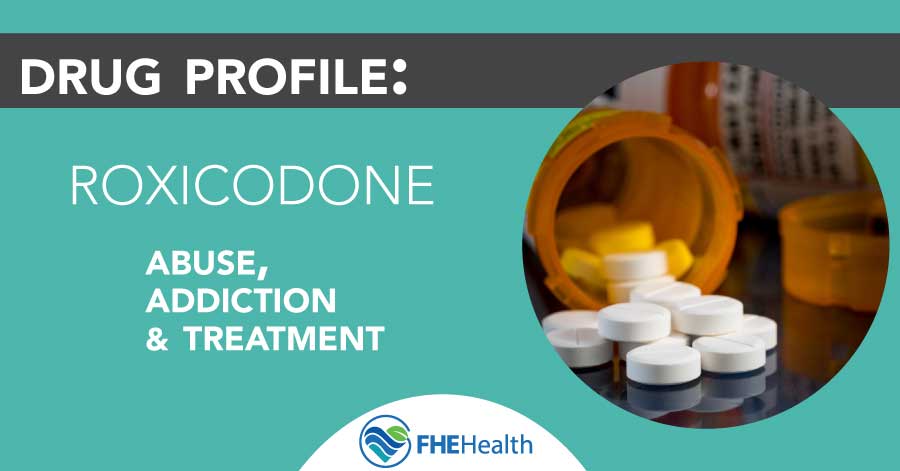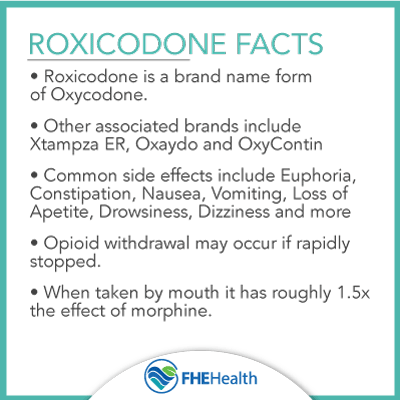
|
|
The proliferation of narcotic medications in the United States has created an epidemic of dependency. Whether prescribed or obtained illegally, these medications can have severe side effects and may lead to overdose. This guide covers everything you need to know about Roxicodone, including how it’s used, its potential side effects and treatment options for addiction.
What Is Roxicodone?
Roxicodone is a narcotic painkiller that’s prescribed to treat moderate to severe pain. Patients may be given the medication to reduce pain when recovering from serious injuries, medical procedures or chronic pain disorders. It’s one of many drugs in the oxycodone class, and widespread abuse of the drug is common, especially among high school students.
Due to its popularity as a street drug, many pressed pills are sold illegally that may or may not contain actual Roxicodone. Pressed pills can be more dangerous than the narcotic medications they claim to be because users don’t know what’s actually in them.
What Does Roxicodone Do?
 Roxicodone interrupts signals in the brain that affect the perception and bodily response to pain. By blocking certain nerve signals and responses, patients can feel relief from pain along with a reduced inflammatory response. Patients may also experience drowsiness, which can be beneficial when trying to manage pain at night.
Roxicodone interrupts signals in the brain that affect the perception and bodily response to pain. By blocking certain nerve signals and responses, patients can feel relief from pain along with a reduced inflammatory response. Patients may also experience drowsiness, which can be beneficial when trying to manage pain at night.
Doctors must weigh the benefits of prescribing Roxicodone against the potential side effects, which include physical and mental dependence. If someone has been using the medication for a significant period of time, they may need to be weaned off the drug gradually. It could also become less effective over time as the body becomes dependent on the presence of opioids in the blood to function.
While the effects of Roxicodone wear off in about 6 hours, it takes 24 hours from the last dose for the drug to be completely eliminated from the bloodstream. It can appear in drug tests for longer than that; saliva and urine tests can detect Roxicodone for up to four days after taking it, and it remains in hair follicles for up to three months.
What Is Roxicodone Made Of?
Roxicodone is an opioid, which means it’s derived from opium. Narcotic medications are synthetic opioid compounds that alter the brain’s chemistry to treat pain. It’s primarily sold in pill form but may come in liquid suspensions as well. Those who abuse the drug may take it orally, snort it in powder form or inject it directly into the bloodstream.
Roxicodone vs. Oxycodone
Oxycodone is a class of medications all made of the same substance. It originally hit the market as OxyContin in 1996 and grew to over $1 billion in annual sales by 2000, but there are multiple pharmaceutical companies that produce their own versions today. Roxicodone is simply a different brand name for the same medication.
How to Identify Roxicodone
Roxicodone may be referred to as Roxy 30, kicker or Hillbilly Heroin. When sold in tablet form, it has a circular shape with a stamp that reads 54 582, 54 719 or 54 199, depending on the dosage. 54 199 is the stamp for the most potent form, which contains 30 milligrams of Roxicodone. The pills can appear white, green or blue.
It can be more difficult to identify Roxicodone when it’s sold as a liquid suspension, and the medication is often laced with other street drugs when sold illegally. Obtaining this drug on the street is dangerous because those expecting pure Roxicodone don’t know what other substances are in the medications they receive and how they may react to them.
Pressed Roxy 30
The Department of Justice released a drug fact sheet detailing the rise of counterfeiting of narcotic medications such as Roxicodone. Roxy drugs sold on the street are produced to look like the original, but there are ways to tell if the medication isn’t manufactured by a pharmaceutical company. Pressed pills aren’t as stable as authentic medication, so they may crumble easily, appear slightly off color or have stamps that don’t match the font of the original medication.
Fentanyl is the most common additive used to produce pressed pills because it creates dependence more quickly. Criminals lace street drugs with fentanyl because it increases the chances of addiction and makes people seek more of the drug in the future. Fentanyl isn’t the only substance that may be laced with narcotic medications, so people don’t know what they’re getting when they purchase these medicines online without a prescription.
Addiction to Roxicodone
The makers of medications like OxyContin and Roxicodone have been subject to intense scrutiny due to the addictive nature of these drugs and a lack of evidence to suggest they work more effectively than their less addictive counterparts. Doctors are advised to use extra caution when prescribing Roxicodone and may attempt to use alternatives first. In addition to the risk of dependency, Roxicodone has the following side effects:
- Muscle cramps, spasms and discomfort
- Nausea, vomiting and loss of appetite
- Interaction with alcohol, other prescription medications and certain foods and natural supplements
- Liver and kidney failure
- Excessive fatigue
- Inability to sleep
- Heart palpitations and increased sweating
- Dry mouth or increased thirst
- Constipation and bloating
- Respiratory distress
As a person becomes addicted to Roxy drugs, they require more of the medication to experience the same euphoric effects. Abuse can lead to overdoses that have life-altering or fatal consequences. Someone who’s addicted to Roxicodone can’t simply stop using the medication and must be weaned off the drug gradually to avoid severe withdrawal symptoms.
Treating Roxicodone Overdose
A drug called Narcan contains naloxone, which can be used to treat a suspected overdose. Narcan is a nasal spray that interacts with opioids in the bloodstream to render them ineffective and can help someone with an overdose survive until paramedics arrive.
Treatment for Roxicodone Addiction
Whenever someone is admitted to the hospital due to a Roxicodone overdose, they must be monitored for withdrawal symptoms as they come off the drug. They might require medications to address their withdrawal and need to receive smaller doses of Roxicodone over time until they can stop using it completely. Eliminating the medication from the body is only the first step toward recovery, as they need to address the mental health concerns at the root of their addiction.
It’s recommended that people who experience narcotic dependence seek inpatient treatment and mental health support services following treatment for their physical symptoms. Inpatient treatment needs to be focused on the root causes of addiction and provide coping mechanisms that people can use if they feel the urge to abuse drugs in the future. Some programs are specifically designed to address a dual diagnosis, where a patient suffers from a mental health disorder and drug addiction simultaneously.
Take the First Step With FHE Health
Whether you’re concerned that someone you know has a drug addiction or trying to address your own dependence on narcotics, we can help. Our staff is on hand 24/7 to provide you with support and help you take the next steps toward freedom from your addiction. Call us at (833) 596-3502 or fill out our contact form to get started.






